A couple of things struck me during the recent community conversation about Fayetteville's resolution extending civil rights protection to our lesbian, gay, bisexual and transgender neighbors. First, many people are not well acquainted with LGBT friends. And, second, visceral feelings are powerful.
Several newspaper columns and a few speakers at City Hall believe an ordinance protecting LGBT minorities from discrimination is a solution for a non-existent problem. Fayetteville is such a nice, tolerant town, they say. It is unlikely that LGBT neighbors actually experience real discrimination here.
My hunch is that folks with that opinion just haven't made many LGBT friends yet. I wish they could sit in my office for a while.
It is pretty well known in the community that I am a pastor who accepts LGBT persons. Probably because of that public acceptance, I've heard a lot of stories from people who might otherwise keep their experience "in the closet."
I've listened to stories of Fayetteville people being beaten up, threatened, bullied, and followed menacingly on our public streets. I've heard friends tell of being fired from their jobs, passed over, or not hired when their qualifications and performance were exemplary. There was a couple who went into a restaurant and were simply ignored.
Just the other day a gay friend told about the house renovation he and his partner planned. They contacted their bank about financing. When the loan officer visited, my friend was working in the yard and invited the officer inside saying that his partner could show him the plans and the house. When the banker realized he was visiting a gay couple, there was a quick, subtle change in his expression. Gay people see that a lot. Later, when the bank's assessment of the home's value came back, it was a very low figure, far lower than the neighborhood's comparables. The low valuation made the project loan impossible. They were about to give up on it.
But my friend talked to an acquaintance at his bank asking if there was something he could do to challenge the low assessment. "It's a big bank and a complicated system," he said discouragingly. "But there are other banks." My friend took the hint, went to another bank, and got another estimate that raised his home's assessment by one-third, about what they had expected in the first place.
Would you want your property devalued by one-third for any non-economic reason? Of course not. Maybe with a protective city ordinance a bank officer would think twice about doing so.
If you haven't heard stories like I've heard, it may be that you haven't appeared accepting and open to our LGBT neighbors. These stories are common experiences for minorities.
There was a second thing that struck me in our community conversations -- the profound visceral fear that so many have toward LGBT people. The fears are real, sincere and powerful. They remind me of the fears I witnessed in my childhood when black neighbors called for their equal rights.
I grew up in Mississippi where around 90 percent of the white people felt threatened by desegregation. These were good people -- business owners, teachers, and even some pastors. They just couldn't imagine some things interracial. Their deepest fears congregated around three things: interracial romance (and the expectation of rape), swimming pools and restrooms. Today's fears over LGBT civil rights tend to congregate around these same fears.
Fifty years ago when the Civil Rights Act passed, communities around the South shut down their swimming pools and some closed access to public bathrooms. In their imaginations, horrible, unthinkable things might happen otherwise. My closest friend's mother said to her children, "I don't mind them going to school with you, it just bothers me that you would swim with them." The fear was visceral and powerful. Such racial fears are rare today, but they are resurfacing toward LGBT people.
The facts are that LGBT folks are among the most frequent targets of sexual assault. They have more reason to be cautious in a public restroom than the rest of us.
Don't be afraid. Maybe you don't know many LGBT folks. I know lots of gay people, mostly Christian, because my work is in the church. I know about 20 transgender persons now. Good people. Just like the rest of us. They are not dangerous or predators. I like them. If you knew them, you would like them, too.
Try loving your LGBT neighbor as yourself. You may find yourself blessed with a broadened range of acquaintances. And fewer visceral fears.
LOWELL GRISHAM IS AN EPISCOPAL PRIEST WHO LIVES IN FAYETTEVILLE.
Commentary on 09/07/2014
